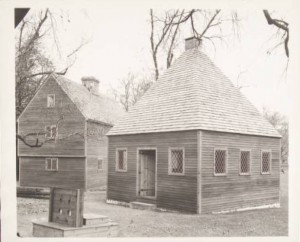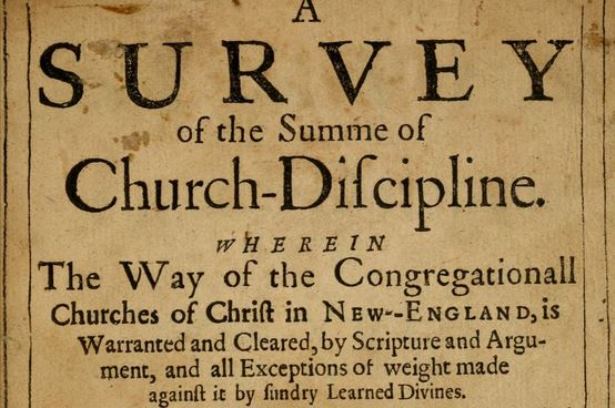By Nancy Finlay
The man who became famous as the “father of Connecticut” was born in 1586 in a small village in the county of Leicestershire in central England. He attended grammar school at Market Bosworth, a tiny nearby town, and went on to Cambridge University, where he received his BA in 1608 and his MA in 1611. While a student at Cambridge, Thomas Hooker underwent a profound religious experience and decided to become a minister. Such conversion experiences were central to the beliefs of the Puritans, a Protestant sect that arose within the Church of England during the late 16th century. Puritans believed that in the process of conversion, they directly experienced the wrath and love of God. Unlike other, more radical sects, however, they sought to remain within the Anglican Church and to reform it from within. Emmanuel College at Cambridge, which Hooker attended, was a hotbed of Puritanism.
Hooker became a powerful and popular preacher, attracting a large following. He served first in a small village church just outside London and later in the large market town of Chelmsford. A neighboring vicar denounced him to William Laud, the Anglican Bishop of London and an ardent opponent of Puritanism. Ordered to abandon his practices and beliefs, Hooker resigned his position in Chelmsford and took a job as schoolmaster in yet another small village. This did not end the threat of prosecution, however, and he eventually fled to Holland where there was already a large community of Puritan exiles. Finally, in 1633, he decided to immigrate to America. On July 10, he and his family sailed for Boston on the Griffin with a large group of Puritans, including John Cotton, another prominent Puritan minister.
Thomas Hooker Arrives in North America
Founded in 1630 as a Puritan stronghold, Boston was still a raw new town on the edge of the wilderness. John Cotton assumed the role of its leading minister. Thomas Hooker served as minister to the citizens of nearby Newtown, a settlement on the opposite side of the Charles River that later became Cambridge. Almost immediately, Hooker’s congregation began seeking to escape the Boston area and the influence of John Cotton. They began looking westward to the Connecticut River Valley, petitioning the General Court for permission to move there.

Samuel E. Brown, Mr. Hooker and his Congregation travelling through the Wilderness, 1998.152.86 – Connecticut Historical Society
In June 1636, less than three years after Thomas Hooker arrived in Boston, he and one hundred members of his congregation set off on the two-week overland journey, accompanied by 160 head of cattle, goats, and pigs. They followed a Native American trail, later known as the Connecticut Path or the Bay Path, west to the Connecticut River and then south to the future site of Hartford.
There was already a scattering of settlements in the Connecticut Valley when Hooker and his congregation arrived there. The party passed indigenous villages as they made their way along the Connecticut Path, and encountered a small group of English settlers in Windsor, as they traveled south along the river. There was a Dutch fort at the mouth of the Little River (later the Park River) immediately to the south of Hartford, and another small group of English settlers in Wethersfield, immediately south of that. Throughout the 1630s, English settlers continued to arrive, most of them making the long overland trek from Boston.
Spreading Puritanism in Hartford
As minister of the church in Hartford, Hooker enjoyed enormous influence. At first the river settlements functioned as an adjunct of Boston, governed by eight magistrates appointed by the Massachusetts General Court, but this was clearly not an acceptable long-term solution. In 1638, Hooker preached a sermon on the text, “Choose men of wisdom, understanding, and repute…and [the Lord] will set them in authority over you,” arguing that the people of Connecticut had the right to choose their own government. This sermon served as inspiration for the Fundamental Orders of Connecticut, which established a civil government and assured the existence of Connecticut as a separate colony, independent from Massachusetts. The Fundamental Orders served as the legal basis for the Connecticut Colony until Charles II granted it a formal charter in 1662.

Replicas of the 1636 church and house built by Reverend Thomas Hooker, the founder of Hartford. The replicas were constructed on the state capitol grounds for the Connecticut Tercentenary Celebration, 1935 – Connecticut State Library and Connecticut History Illustrated
Not only was Hooker one of the leading figures in the Connecticut Colony; he was also one of the leading Puritan theologians in New England. He took part in the trials of Roger Williams and Anne Hutchinson and in several church councils. His book, A Survey of the Summe of Church-Discipline, is considered one of the best expositions of Puritan church doctrine. Sadly, Hooker did not live to see it published. The ship carrying his original manuscript to England for printing sank and Hooker died before completing a second draft—succumbing during an epidemic in the summer of 1647.
His book finally met with publication, in London, the following year. Cotton Mather, the grandson of his old rival John Mather, praised him as “the light of the Western churches.” Another contemporary called him “that great Elijah, that renowned man of faith.” His trek to Hartford was the symbolic beginning of America’s westward expansion, and his principles (stated in A Survey of the Summe of Church-Discipline and in his numerous sermons) not only supported the dominance of the Puritan church in succeeding centuries but also provided a tentative basis for American democracy.
Nancy Finlay grew up in Manchester, Connecticut. She has a BA from Smith College and an MFA and PhD from Princeton University. From 1998 to 2015, she was Curator of Graphics at the Connecticut Historical Society.









